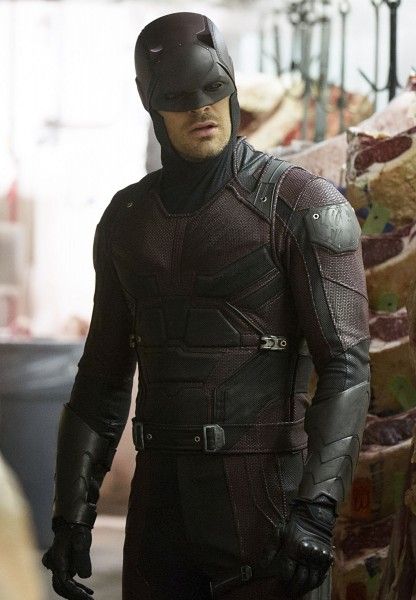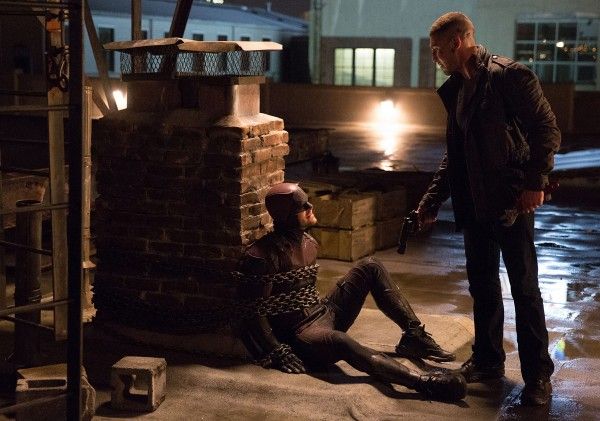Collider Review:
‘Daredevil’ Season 2 Review: No More Half-Measures in Netflix’s Superb Marvel Adaptation
BY CHRIS CABIN 3 HOURS AGO
SHARE TWEET
513
17
There’s a small, almost ignorable shot in the second season of Netflix’s
Daredevilthat sums up the acute, surpassingly attentive visual and auditory style of the Marvel adaptation. When we first see the home that once housed the family of Frank Castle (
Jon Bernthal), who goes by the name of The Punisher in the press, the shot opens with a sprinkler, the kind that percussively sets out a stream of water. If one were to close one’s eyes, the sound would not be unlike automatic gunfire, something that Mr. Castle knows an awful lot about. The image is one that you might equate with domestic tranquility but it hides a history of unspeakable brutality, crime, and something like evil. It’s not
Kyle MacLachlan finding the ear in the field, but the show’s use of sound and image to infer or suggest as much as any line of dialogue says continues to set this series apart from its half-measured kin.

Image via Netflix
Ironically, a half-measure is exactly what Castle believes the titular suited hero, also known as Matthew Murdock, played with extraordinary charisma and physical oomph by
Charlie Cox, to be, a vigilante whose code of ethics and morals makes him only marginally impactful to a crime-corroded city. In the wake of Daredevil’s taking down of Wilson Fisk, Murdock’s beloved Hell’s Kitchen is now open for business for all sorts of gangs, and despite his best efforts, Daredevil can only stop so much crime night by night. When The Punisher shows up, a dozen or so members of the Irish mafia are gone for good, whereas, as Castle brings up, Daredevil’s no-killing policy offers a second chance for murder, theft, and rape as often as redemption. As these two heroes struggle with one another, the series becomes a striking polemic of morals and ethics, a deep-dive into the question as to whether death is actually a deterrent to crime at all.
And like any intelligent act of storytelling,
Daredevil’s second season hardly gives a clear answer to this impossibly complex question, and goes to great lengths to make the stakes of this argument intensely involving and thrilling. When the two men ultimately hold court with one another in the third episode, one of the best of the season and series on the whole, the show’s writers and creators craft a simmering two-hander centered on just how much the life of a repeated murderer is worth in the world at large. The conversation is heated to say the least, and to underline the passion and fury of the subject matter, the tête–à–tête concludes with an exquisitely choreographed and shot fight scene that nearly tops the shadowy free-for-all that Daredevil survived to save a child in the first season. Echoing the series’ fascination with Catholicism, the punishment of the body for Daredevil here serves to reverberate the mental fortitude and struggle that he suffers for his beliefs, which he has given his full faith towards.

Image via Marvel
And it’s ultimately not just the ferocious Castle, whom Bernthal plays with surprising depth and layers of similar philosophical anguish, that tests Murdock’s beliefs in what he does and how he approaches justice outside of the courtroom. His best friend and law partner, Foggy Nelson (
Elden Henson), continuously questions the legitimacy and outright good of Murdock’s nocturnal activities, especially now that he’s fully aware of Murdock’s actions as Daredevil. As a character, Nelson is symbolic of working for positive progress as a defender of legal rights, of a studied, ambitious, and clever mind being a more helpful tool than martial arts, and the writers seemingly echo these sentiments in Karen Page, played with a wondrous mix of brass and sensitivity by
Deborah Ann Woll, whose flirtations with Murdock become increasingly meaningful this season. Ultimately, however, Page suggests that emotional involvement, beyond even Foggy’s ironclad empathy, is the key to fully understanding the worth of a life, as much as when it comes to her closest friends as with a killer and a torturer like Castle.
There were traces of this kind of philosophical debate and consideration in Season 1 of
Daredevil, but Season 2 invokes these concepts with a stronger, clearer constitution, both in visuals and writing. One of the best images of the season comes when Karen looks at an x-ray of Castle’s head, one that shows a bullet wound in his temple. The image of Castle’s head works as a variation on The Punisher’s famous logo, the angry skull image from the comics, and in one fail swoop suggests that the psychology, the physical history of Castle, is far more important and enveloping than his bloody actions as a mercenary. It also quickly underlines the fact that it was the tragic actions that led to the wound that created The Punisher, which made Frank Castle lose track of his humanity, even if he reserved it before the event. It’s emblematic of what creator
Drew Goddard, and his fellow writers and directors, have set out to do with this series: find the complicated, deeply human characters that these outlandish characters in capes and costumes are, as a way of invoking the true pain and pressure of what they do.

Image via Netflix
That
Daredevil also sports some of the best action sequences of this decade makes a rather strong case for the MCU to follow suit, by worrying less about the humongous, interweaving storylines of the films and thinking more about visual style, symbolic imagery, and a streamlined focus on character in the writing. Yes, the films have considerably less time to do all of this in, with a lot more narrative ground to cover, but with the arguable exception of
Iron Man 3, none of the films have even an iota of the seductive intimacy and heart of this show. Like Murdock himself, the show is arguing for the importance of knowing the conflicting, chaotic inner life of a hero as much as the adventurous physical life, which gives off a certain buzz of entertainment but shows little if any interest in picking up on the characters’ gesticulations, inflections, or any little ticks of behavior that may reveal the honest nature of a character.
With Castle, Murdock, Nelson, and Page, as well as
Stephen Rider’s Detective Lieutenant Tower and
Elodie Yung’s irrepressible Elektra, the series finds overwhelmingly sincere and effective traces of humanity in a genre that has been hard-pressed to feel overtly pre-conceived in its political, societal, and philosophical ideas. In contrast,
Daredevil, like the similarly sensational
Jessica Jones, feels like a show that is constantly evolving, and consistently searching for challenges, whether they be warding off a dozen-deep gang of homicidal bikers or testing the very rules that dictate a civil society on the brink of bedlam.
★★★★ Very Good – Damn Fine Television
"We did it again! Another album, . . jokes on you jack!"

 Damn so many questions....
Damn so many questions....
 Damn so many questions....
Damn so many questions....







